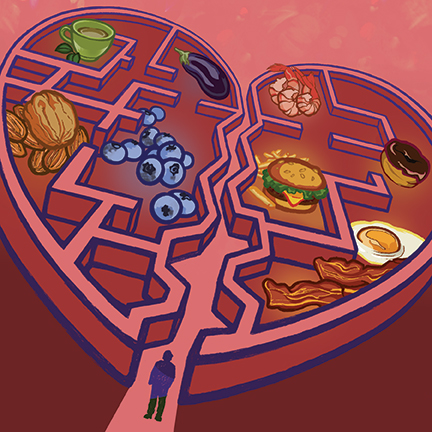You Say You Have a Resolution
How taking small steps can yield big change

A fresh New Year feels like a blank slate of opportunity unfolding — a chance to kick bad habits and start anew. Yet, research shows that fewer than half of Americans make New Year’s resolutions, and of that group, only 9% said they were successful in keeping them.
In 2023, the most popular resolutions were overwhelmingly health-related (exercising more, losing weight and eating healthier), followed by saving more money and being happy.
If making a resolution is so important to people — at least in January — why does their motivation wane by February?
You should pick a resolution that you want to achieve and make sure it aligns with your personal goals and values — not something your friends or spouse think you should do, said says Rachael Wizwer, a behavioral health consultant at Wentworth Health Partners Internal Medicine, part of Mass General Brigham.
“Making a resolution can be helpful, as long as it is realistic,” she says. “People can be successful if they write down their goal, visualize it and post it on a wall or mirror. Sharing your goals with someone you trust is also helpful, as it increases your accountability.”
If you’re interested in measuring progress toward your resolution, you might consider setting SMART goals — specific, measurable, attainable, reasonable and timely goals. If you want to lose weight or drink less alcohol, you should figure out how to break that goal into doable chunks and reward yourself after you hit the smaller goals. For example, if you want to drink more water, instead of gulping a gallon of water on day one, you might start by increasing your intake by a few ounces daily.
For resolutions that are a little more nebulous, you might have to get creative with your SMART goal setting, Wizwer says.
“Your specific goal could be to have more energy in your daily life; you might measure that by indicating how you feel after you wake up each morning and go walking,” she says. “Then, to determine if it’s attainable, you must consider if you can visualize walking daily to maintain your energy. Under reasonable, you might make a contingency plan if it’s raining or snowing out. Under timely, you might plan to walk five times a week, every morning.”
By writing down your perceived energy level daily using a scale between 1 and 10, you can monitor your progress. Wizwer stresses that a resolution should be manageable for people.
“If you’ve tried before and are feeling discouraged, you might want to reach out and ask for help,” she says. “If you feel like you didn’t set a realistic goal, it doesn’t mean you can’t try it again in a few months.”
Health-related resolutions don’t have to focus on weight loss and exercise. Focusing on gratitude, getting more rest, cutting down on TV and social media, and taking care of your needs can all support a healthier lifestyle.
Reconsider the cold turkey approach
How often have you burned yourself out trying to establish a new habit, only to give up entirely?
In terms of making any behavioral change, taking a “cut back” approach may work better for some people, says Jonathan Eddinger, M.D., medical director of cardiology at the New England Heart & Vascular Institute at Catholic Medical Center.
For example, long-term smokers interested in kicking the habit understand the dangers of smoking, and most have tried to quit numerous times. Smoking isn’t a choice for them — it’s an addiction, and often, when people begin to view it that way, it can relieve some of the pressure, Eddinger says. They also need to be in the right frame of mind to quit.
“It’s multitiered; people might need to get other things in their lives in place first to quit successfully,” he says.
Individuals who choose to work with their health care providers can benefit from nicotine replacement therapies (such as Chantix or bupropion) to support them as they cut down on the number of cigarettes they smoke.
Providers can also help individuals with a significant amount of weight to lose amid other health concerns. If you have arthritis that limits your ability to exercise, your limitations could outweigh your motivation to shed pounds.
“Obesity is an incredibly complex mechanical and metabolic disease,” Eddinger says. “There are two pieces to it. The load of weight creates an issue with mobility and arthritis. Then, there’s the metabolic piece, which is significant in terms of contributing to the risk of diabetes, high blood pressure and congestive heart failure.”
By working with your provider, you can determine whether any of the new injectable weight loss medications might be right for you and if there are other health concerns you should address first, he says.
Getting a good night’s sleep is one of the most overlooked habits contributing to good health. Instead of adding more to your plate this year, you might opt for more shut-eye. Eddinger recommends that adults aim to get between seven and nine hours of sleep. If you’re regularly getting less than six hours of sleep, your risk for heart disease, stroke and cognitive impairment rises.
“Sleep is essential, restorative and part of managing many chronic diseases. Over half of American adults will likely experience insomnia in their lifetime. Or they’re able to get to sleep but unable to maintain it,” Eddinger says.
Conversely, getting enough rest makes it easier to lose weight.
“If you’re not sleeping enough, you need more caffeine and don’t have enough energy for exercise. You tend to eat more, make poor choices and get less exercise,” he says. “Talking to a medical provider can be helpful if you’re also looking to improve your sleep habits.”
Staying healthy through the
‘heart’ of winter
Dr. Swapna Sharma, a cardiologist at Elliot Hospital, has five tips for staying healthy through the winter months, whether you prefer to enjoy the brisk outdoors or want to stay huddled
up inside.
Keep moving: “Unfortunately, we see our outdoor exercise regimens crumble as the winter months come along,” says Sharma, who likes to run to stay in shape. “It’s important to get out there and get moving.”
If you’re unwilling to brave the cold,
she suggests “retail therapy,” but that doesn’t necessarily involve shopping. “Folks can
get out to the malls and the retail centers that have a lot of space for them to walk
and get some laps and get some steps in. Bring a walking buddy to make it more enjoyable.”
For those snowbound days, explore video exercises on YouTube. Sharma enjoys riding her Peloton bike. “It gets your heart racing. The classes are fun, and you can stay warm inside.”
Eat well: “For a lot of patients, this means limiting salt in their diet, limiting saturated fats and processed foods. It’s all about balance,” Sharma says. “Small compromises really can lead to big changes. Try to eat some fruits and vegetables every day. This will help not only keep your heart healthy, but it will give you the vitamins to boost your immune system and keep it at the top of its game.”
Get your flu shot: “Complications from the flu are more likely in people who have heart disease, and we see this all the time. Unfortunately, the complications I’m talking about include heart attack, pneumonia, bronchitis, and even death. It’s not fun getting the flu shot, but it’s an easy fix to help protect your heart.”
Protect your mental health: “The winter blues or seasonal affective disorder can sneak up on us as the winter months come and the sunshine fades away. I recommend trying to take time for yourself, do what makes you happy, and focus on the things that you know can help you cope with stress. It could be meditation. It could be yoga, exercise, crafting, anything that you have found to help yourself de-stress during
these times. Try to avoid alcohol and drugs and things that could cause more harm to your body. Surround yourself with family and friends.
Follow your doctor’s advice: “Take your medicines as we prescribe and keep up with your doctor’s appointments. If you’re a heart patient, this means that you know how important it is to take your medications, to regulate your blood pressure, to lower your cholesterol, and to keep your heart disease at bay. See your local friendly cardiologist. We’re here to help you, and we truly care about keeping your heart healthy.”
Dr. David Min, section chief of cardiovascular medicine at Dartmouth Health, says winter brings “its own set of sniffles and respiratory related colds for a lot of different reasons due to increased exposures. Air quality in some areas may not be great, and so we are just more prone to respiratory illnesses.”
Do your chores: Min encourages people to keep moving throughout the winter wherever they are. “If we can’t do that outside because it’s not safe, because it’s slippery, because the conditions don’t allow for it, then I think there are things that you can do inside the home,” he says, adding that could be as simple walking around the house doing your chores.
Stay hydrated: If you venture outdoors for aerobic exercise, be sure to stay hydrated and bundle up. “If your body is exposed
to more cold, your heart is going to work harder in those situations,” Min says.
“Staying hydrated is important given that your heart needs that fluid to squeeze. And there are losses that you feel when you start sweating that we don’t really pay attention
to in the winter.”
Shovel with care: “Shoveling snow is exercise. It is strenuous exercise. (Snow) is wet and heavy,” Min says. “And if you haven’t been doing regular exercise normally, going out and saying, ‘Oh, ‘I’m going to shovel out the driveway or the sidewalk,’ if you haven’t been doing that, take caution. If you have any symptoms, don’t dismiss them. Seek emergent care.”
— Mike Cote













